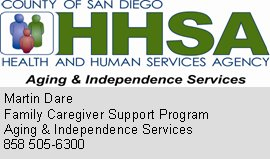desperate acts? We may never know the answer, but we do know that these individuals had been caregivers. For some period of time, each of them had been faced with the decline of his/her spouse and faced with increasing care and home responsibilities.
Fortunately few caregivers take these extreme measures to end their pain. But that doesn’t mean that there aren’t a lot of people suffering.
Southern Caregiver Resource Center (SCRC) provided some recent statistics of caregivers they serve in our county. The average age is 60, and one-third of them are still employed. About 40 percent are adult daughters caring for one or both of their parents. About 35 percent are spouses.
Family caregivers served by SCRC report they provide an average of 92.6 hours of care a week, or more than 13 hours a day! About 20 percent of those have no other family support to assist them in this role.
Not surprisingly, 22 percent indicated that their own health had declined over the past six months. Emotional health problems are much more prevalent than physical health problems for the caregivers aided by this agency. About half of them have symptoms of clinical depression. Some 60 percent say they experience feelings of high burden.Thousands of people in our county who don’t even call themselves caregivers are assisting a family member in some way. And as the statistics from just this one caregiver-related agency indicates, the toll on them can become great.
There are several agencies in San Diego County that can lighten the load for these caregivers. Many of them are involved in a Caregiver Coalition that is looking at how to reach out to more people who are suffering from the often all-consuming tasks and emotions that come with caregiving.
Clearly, we cannot over-communicate this message. There remain desperate caregivers who feel alone and hopeless, unaware of resources or immobilized by the stress. We must continually strive to link with them and help them find ways to ease their burden.
Agencies or individuals who would like to be active in the Caregiver Coalition are invited to attend the meetings held from 10 to 11:30 a.m. the last Thursday of each month please contact:

.
![]()
TEL- 619-427-4111 Email - Health@infooption.com
Salud+HealthInfo is for information and educational purposes only. You should not rely on this information as a substitute for personal medical attention, diagnosis or hands-on treatment. If you are concerned abut your health or that of a child, please consult your family's physician or health provider immediately and do not try to diagnose yourself.
Copyright © 2001-2009 Info Option Network
 info
info
